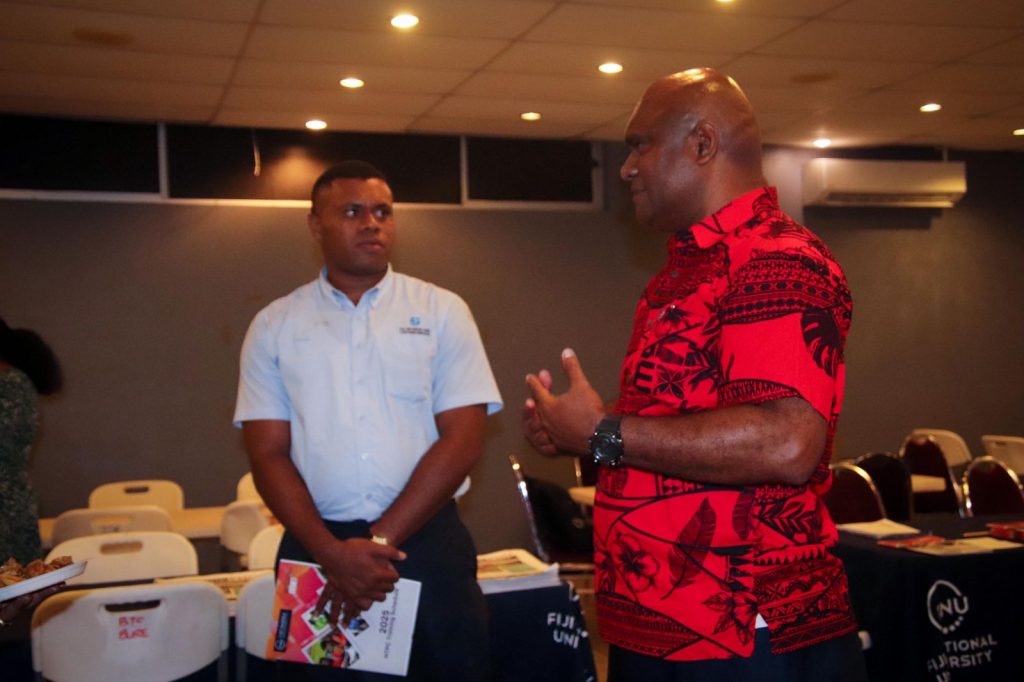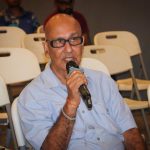

Dr Isimeli with FRCS representative
“Our young people today are more attached to gadgets than books,” said Dr Isimeli Tagicakiverata, the Fiji National University’s (FNU) Pro-Vice-Chancellor TVET Pasifika and NTPC, during the Industry and Community Discussion Forum (ICDF) at Ba Civic Centre last night.
“We need to bring back a strong reading culture. Readers become better speakers and thinkers, and that’s something we need to encourage across our communities.
He made these remarks in response to a concern raised about the need for training in public speaking and communication skills, especially for individuals conducting workshops and trainings at the community level. Tarun Soni, a district officer and Justice of the Peace in Ba, highlighted that presenters often struggle with grammar and effective verbal communication, which weakens the impact of their outreach.

Tarun Soni
“There’s a real gap when it comes to speaking skills,” Soni said. “We need short courses that focus on communication, presentation, and public speaking so that those representing organisations can better connect with the community.”
Dr Tagicakiverata agreed that public speaking is a very important skill, not just for professionals but also for students and community leaders. He said this needs to be nurtured from a young age.
“We should look at working with the Ministry of Education to promote more speaking competitions and auditory learning opportunities in schools. If students build these skills early, they’ll carry them into tertiary studies and beyond.”
Another topic that was brought up was a shortage of accountants and tax agents.

Ifzal Shaukat
Ifzal Shaukat of the Fiji Revenue and Customs Services noted a shortage of accountants and tax agents in the region and explained that many small business owners are eager to comply with tax obligations but lack the knowledge to do so. The cost of hiring professional accountants can be too high for small operators, such as canteen owners earning modest weekly incomes.
Shaukat suggested FNU, possibly in partnership with FRCS and government agencies, could offer short courses focused on practical tax and financial management for MSMEs. He also emphasised the importance of equipping business owners, directors, and executives, many of whom may not have financial backgrounds, with the skills to understand their financial statements, tax duties, and overall business health.
“This would help them make informed decisions, reduce dependency on accountants, and improve their businesses’ resilience and sustainability in a competitive market,” he said.
Dr Tagicakiverata welcomed the suggestion and confirmed that FNU was open to deeper collaboration to address these gaps through tailored community training programmes.
He noted that FNU already has initiatives on the ground designed to support grassroots entrepreneurship, including a short course titled Small Business Etiquette, which covers basic skills and knowledge for individuals starting micro and small businesses.
Dr Tagicakiverata said the university was ready to work directly with stakeholders like FRCS and other community partners to co-design training solutions that are relevant and accessible to specific groups.
“We are very glad you raised this, because it’s exactly the kind of partnership we’re looking for,” he said.
“We can’t do it alone. With your support, we can design training that’s practical, specific, and impactful, whether it’s for small canteen owners, market vendors, or business executives.”
He added that together, they can empower communities through knowledge and build a workforce that’s skilled, confident, and financially literate.
Dr Tagicakiverata also highlighted that FNU provides flexible and inclusive education pathways for all individuals, regardless of their background or stage in life. Whether someone has dropped out of school, is from a rural village, living with a disability, incarcerated, or an older member of the community, FNU offers opportunities to upskill through short courses, certificates, and diploma programmes, starting from basic training and progressing to higher education.
He emphasised FNU’s integrated pathway model, which allows individuals to move from Technical and Vocational Education and Training (TVET) into higher education or entrepreneurship.
FNU also encourages small business development, such as mobile repair services or trades like small engine repair, as viable career paths.
Additionally, trade testing is available for experienced workers in fields like carpentry, plumbing, or mechanics who lack formal qualifications. Through trade testing, individuals can gain certification as assistant tradesmen (Class 3), tradesmen (Class 2), or supervisors (Class 1), based on their skill level and years of experience.
“Everyone has a pathway. If you have the skill, we can help you get certified,” Dr Tagicakiverata said.
There was also a call to revive the National Trainers Conference to further support professional development in the workforce. He also highlighted the importance of industry involvement in mentoring and workforce guidance, reinforcing the need for collaboration between the University, industries, and communities to build a skilled and future-ready workforce.
Dr Tagicakiverata thanked attendees for their contributions and assured them that their suggestions would be considered.